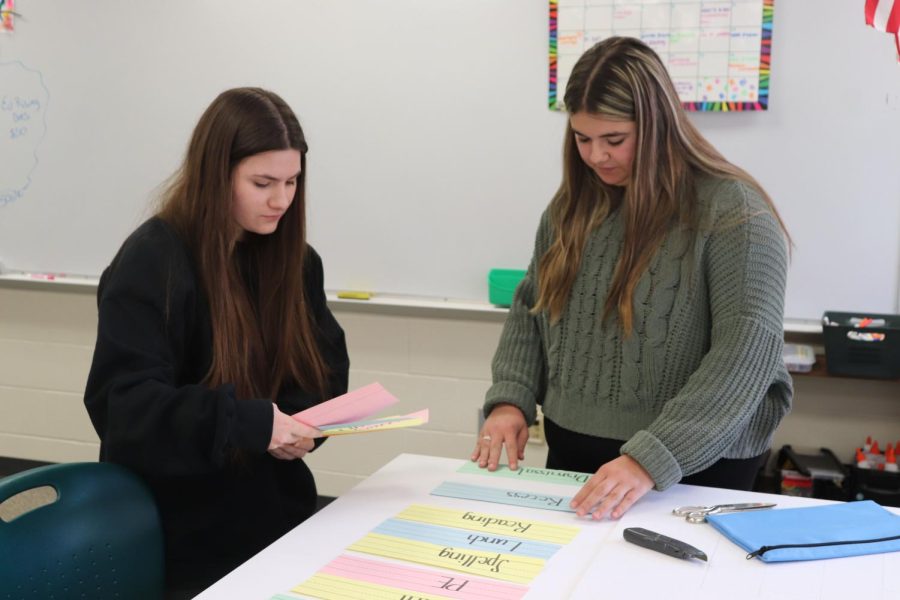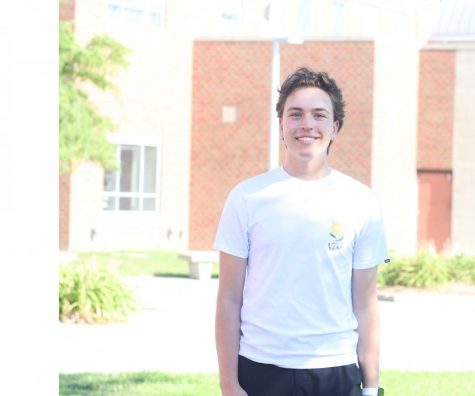Learning through experience
Education Academy students create lesson plans for ACP classes
Education academy students work in class to prepare for the end of the semester. First and second-year students in the academy work in the ACP classroom to develop their lesson plan design and execution. “Both the first and second years do this internship but it looks different for each. Every week on Tuesday for nine weeks, you visit the ACP classroom during the academy. When you’re a first-year, you get paired with one buddy. You eventually write and perform a lesson plan working on something they may need help in. As a second-year, you alternate between the three ACP classes. You work with all the students instead of just one.”
March 15, 2022
The best way to learn is through doing, which is exactly what the Education Academy aims to do by allowing its students to create and implement a lesson plan for individual Alternative Curriculum Program (ACP) students every Tuesday.
The activity has been around since the beginning of the Education Academy and has been used as a way for academy students to gain insight into a different form of education. It also enables students in the ACP program to interact and form friendships with their peers.
“It is part of the Education Academy Program and it fits well with our Introduction to Education class,” Education Academy lead teacher Ali Bragg said. “It has become one of the students’ favorite experiences in the academy and one more way to make our building inclusive. I am hoping the academy students gain lesson plan writing and executing experience and the understanding of working with students with different learning styles. Also, I hope they made new friends.”
Working in the ACP classroom every Tuesday is the academy students’ first internship within the program. They spend nine weeks in the internship; first-year students are partnered with a buddy and are tasked with creating a lesson plan which focuses on a topic or area of which the student needs to spend extra time on. The lesson plans have an objective and a slow release to independent work, then there is a small assessment at the end to see the progress of each student. For second-years, that concept expands. They are tasked with working between three different ACP classes instead of focusing on a singular student. This provides more insight into what running a full classroom and class schedule would feel like, thus allowing them the opportunity to experience what a teacher’s job entails.
“Creating a lesson plan is a lot more work than people assume,” president of Educators Rising Nebraska and senior Hope Belcastro said. “There are standards, unit plans and curriculums that a teacher must follow in their classroom. Lesson plans usually have an objective and they describe what materials are needed, how to teach the content, any partner or group work and an assessment. I have gained a lot of experience from creating lesson plans for ACP as well as general education classes. When writing one, you need to be very detailed. You also have to keep in mind that not everything is going to go perfectly. For example, sometimes my ACP buddy would need a break from content so I needed to write that into my lesson. It taught me how to be flexible and plan for any mishaps.”
Aside from the education aspect, the academy and ACP students are given the opportunity to create and explore bonds they are able to develop over the course of the class.
“Students in the ACP program are among their peers outside of our program on average for one block a day,” ACP teacher Bret Siepker said. “This provides them to not only meet more people but to develop a deeper relationship with someone in the school. I feel like the students’ favorite part is when they get to just hang out with their partner and talk about things like what they are doing this weekend. It allows both people involved to share more about themselves outside of school.”
Academy students who work outside of the classroom to gain firsthand experience with students of varying abilities allow them to feel more confident in their roles as future educators. For many, working with the ACP students allows them to create a more inclusive atmosphere which they can then bring into their future classrooms.
“I hope the ACP students feel more included with the Education Academy paying them a visit every Tuesday,” Belcastro said. “It’s really beneficial for gaining experience on what accommodations a student may need and how to properly care for a child’s academic or social needs. Inclusion is super close to my heart and being with those kids always puts me in such a good mood. They are all such amazing humans to spend time with and I hope we have the same impact on them.”
Through this experience, students involved in the academy are able to gain valuable knowledge about the process of creating and executing lesson plans while the ACP students receive additional help and friendship from their partners. By establishing these connections through the Education Academy course, the future of inclusive education and inclusivity within the community will be strengthened and proliferated.








